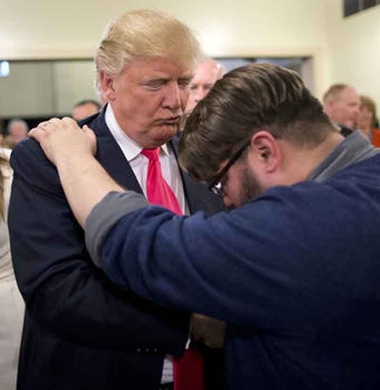After Trump, an evangelical examination of conscience?

Evangelicals, deeply divided over Donald Trump, are wrestling with what the tumultuous 2016 election will mean for their future.
His candidacy has put a spotlight on the fractures among Christian conservatives, most prominently the rift between old guard religious right leaders who backed the GOP nominee as an ally on abortion and religious liberty, and a comparatively younger generation who considered his personal conduct and rhetoric morally abhorrent.
"This has been a kind of smack in the face, forcing us to ask ourselves, 'What have we become?'" said Carolyn Custis James, an evangelical activist and author who writes about gender roles in the church.
The outcome of this self-examination is as important for evangelicals as it is for the Republican Party. Christian conservatives have been among the most reliable members of the GOP coalition. Recent PRRI polls found nearly seven in 10 evangelicals backed Trump. Yet, those numbers are lower than the 79 percent who voted for 2012 Republican nominee Mitt Romney, a Mormon who had struggled to win over conservative Protestants for theological and other reasons.
Any election post-mortem will, of course, be shaped by who wins the White House.
A Hillary Clinton victory could draw energy away from any re-evaluation of the religious right, given her support for abortion rights and gay rights, and the opportunity she will have to shape the U.S. Supreme Court. While many younger evangelicals have a broad range of concerns, including fighting climate change and poverty, they are staunchly opposed to abortion, often more so than their parents.
John Fea, a historian at Messiah College in Pennsylvania, said there could be a Christian right resurgence under Clinton.
"Many evangelicals, whether 'Never Trump' or willing to support Trump, are ultimately shaped by a core set of convictions. They are still going to be — for good or for bad — one-, two- or three-issue voters primarily. I think that persists," he said.
And if Trump wins? Evangelicals who advocated for him, such as Tony Perkins of the Family Research Council and author and broadcaster James Dobson, would feel vindicated before their critics if Trump fulfills his promise to appoint conservative high court justices. "Very early on he was concerned about the marginalization of Christianity," said the Rev. Robert Jeffress, pastor of the megachurch First Baptist Dallas, who advocated for Trump.
Yet, even if Trump proves loyal to Christian conservatives, debate would persist over whether his supporters traded integrity for influence, given sexual harassment claims against him and his attacks on Mexican immigrants, Muslims and others.
"If they can support even Donald Trump, and even after we learn more and more about him, then this has actually been a charade all along designed to raise money or to grasp for power or to build institutions or personal platforms," said Collin Hansen, a longtime Republican and editorial director of the Gospel Coalition, an interdenominational evangelical ministry. He said he hoped leaders who opposed Trump had retained enough credibility to provide conservative Christians "something to build on."
Christian conservatives had split over politics long before this presidential race. Many younger Christians had rejected strategies of the Moral Majority as harmful to the church.
At the same time, conservative churches have become home to growing numbers of Latinos with different voting patterns than white Christians. In a recent PRRI poll, nearly two-thirds of non-white evangelicals supported Clinton.
Still, that shift to more diverse churches with younger leadership is only just beginning. Many of the older religious right figures who backed Trump continue to have an impact through their organizations and Christian radio, even though their influence has dwindled.
Russell Moore, head of the public policy arm of the Southern Baptist Convention, who was an early and vocal critic of Trump, separates the candidate's evangelical supporters into two camps: those who consider Trump a morally good choice and others upset by his moral flaws but more worried about Clinton's potential impact on religious objectors to gay marriage, abortion and other laws.
That distinction may be lost on younger evangelicals disillusioned by this election. Moore said discussion is already under way about religion and political conservatism, and building new institutions to prevent disengagement from public life.
"That conversation will happen with new intensity after the election," Moore said.
After Trump, an evangelical examination of conscience?Copyright 2016 Associated Press.
The Gayly – November 2, 2016 @ 9:20 a.m.





